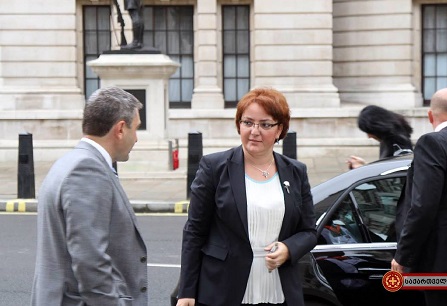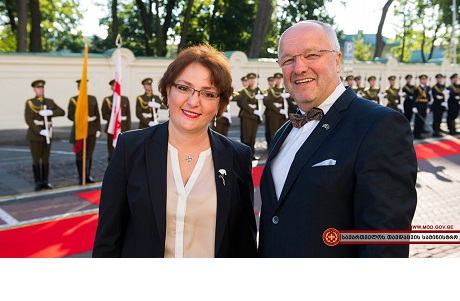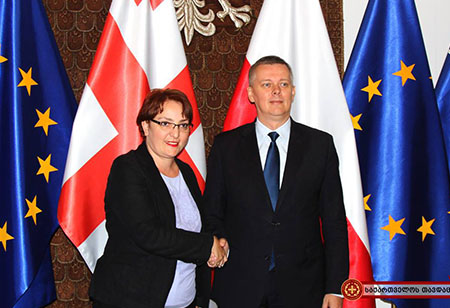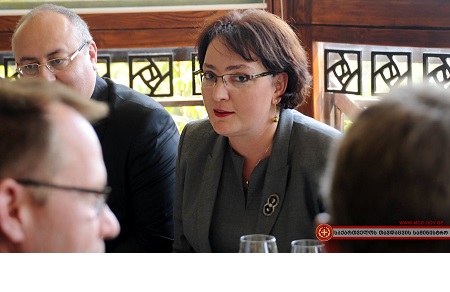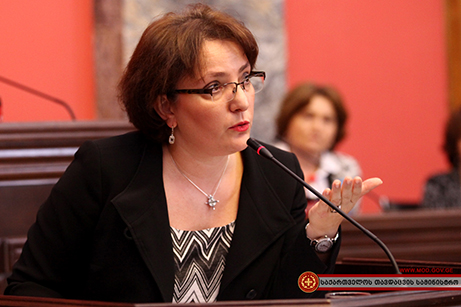Georgia’s Defence Minister answers HARDtalk’s questions on BBC
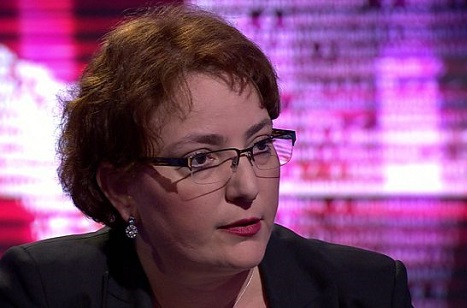
"I believe in Europe and I believe in NATO… [and] if we talk about European peace, it cannot exclude Georgia or Ukraine.”
These words and other harsh truths were spoken by Georgia’s Defence Minister Tinatin Khidasheli when she took part in the BBC’s HARDtalk programme that is famous for its in-depth interviews with hard-hitting questions on sensitive topics.
The TV programme aired earlier today, when Khidasheli was on the final leg of her ten-day European tour to attract foreign support for Georgia as it strived to gain a Membership Action Plan (MAP) at next year’s North Atlantic Treaty Organisation (NATO) summit in Warsaw, Poland.
Georgian Defence Minister @tinakhidasheli says world must not show weakness & leave her nation to "die as heroes" pic.twitter.com/1SUvtdYwFZ
— BBC HARDtalk (@BBCHARDtalk) September 18, 2015
HARDtalk presenter Sarah Montague asked the Georgian Minister whether NATO was prepared to face up to Russia over Georgia; or whether she believed Georgia and Russia could go to war again.
To the question whether Georgia and Russia were moving towards a repeat of the 2008 war, Khidasheli replied: "If the world shows weakness towards Georgia the same way as [it did] towards Ukraine, if the world fails the expansion of freedom … if NATO says this is where freedom ends, after that we don’t care – then yes it’s going to happen."
She added if war broke out before Georgia was able to join NATO: "We will die as heroes. That’s all we can do about it".
Talking about whether Georgia’s possible NATO membership could provoke another war with Russia, the Georgian Defence Minister refuted this and said when NATO expended to a new territory, it only brought peace. Recalling the history of the Alliance, Khidasheli said there was no example of NATO expansion that led to war.
She stressed if Georgia joined NATO, this would not change the way Georgia treated Abkhazia, Tskhinvali (South Ossetia) or Russia.
When asked about her nation’s priorities, Khidasheli said: "Yes, people are worried about jobs - no doubt about it - people are worried about the economy, about agriculture, about where they sell their goods that they produce but if there is [a] war tomorrow in Georgia, all [of these] will be forgotten because people will be dying and Georgia knows this best than any other country in the world because we have been in war for 25 years; in a war for independence, in a war for democracy, in a war for European Georgia.”
The Georgian official said this was not something the nation had learnt from history books but something her generation had experienced firsthand.
"Every single family in Georgia has a member of their family who has been killed during these 25 years by Russian troops, by Russian soldiers. There will never be an increasing support for [joining the] Eurasian Union or for Russia in Georgia,” the Defence Minister said.
As NATO member countries were effectively distracted by the current situation in Syria; the BBC journalist asked Khidasheli why the Alliance would want to provoke Russia by enlarging and offering Georgia membership, thus creating more difficulties for the Alliance, when there was "a far bigger problem” in Syria.
To this, Khidasheli told HARDtalk: "Russia does not need to be provoked, first of all, and it was proven in Ukraine.”
"Second of all, […] the refugee crisis is a big problem but it is not problem that is substituting another problem. There are lots of problems in today’s world. When Afghanistan was seen as a problem, Georgians never said "We have a problem and we do not care”. We sent the largest army to Afghanistan”.
"Just because there is a problem in Syria or somewhere else does not mean, for example, that the problem of people dying in Ukraine just goes away.”
Watch the whole program here.
 Tweet
Tweet  Share
Share
